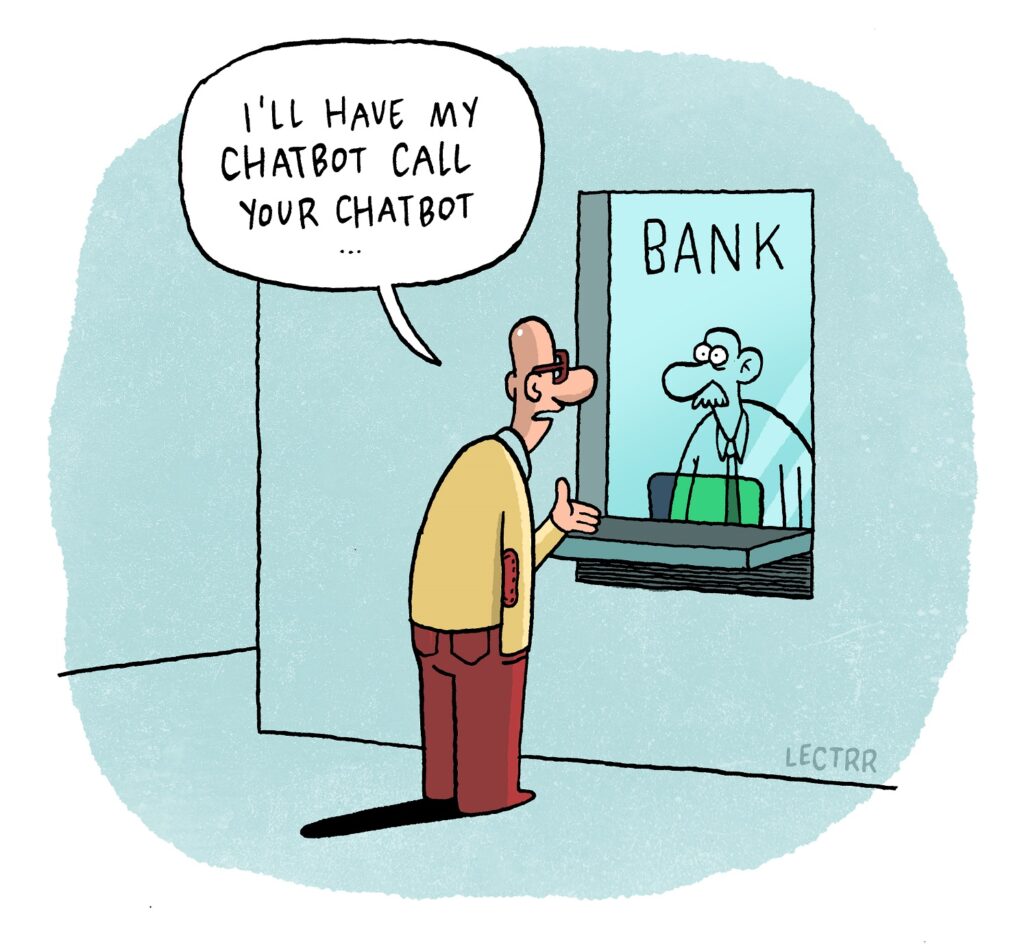I was accidentally chatting to a robot on the phone the other day and it didn’t go well. It wasn’t my fault, even though the swiftly exploding world of artificial intelligence, which is now advancing so quickly that it qualifies for a capital AI, is not my natural habitat.
I was a couple of minutes into my call to what I thought was a man at a Brussels bank when I began to suspect that he wasn’t the real thing.
The only reason I was making the call was because I’d been rebuffed when I tried spontaneously to pop in to my local branch, which used to be the norm in olden days when the guardians of people’s hard-earned life savings would welcome you into a leather-look armchair in a stark office and offer a cup of coffee and, if your savings surpassed a certain threshold, a crunchy biscuit with a red cherry on top.
Apparently that’s all in the past: being client-facing is a not a thing anymore, with anyone, anywhere. These days it’s as much online as they can get away with via websites of information which even includes helpful generic options to choose from which might or might not coincide with your reason for wanting or needing to be in touch in person with your bank at all.
Running out of patience with online (my fault, not the bank’s) and craving quality time with an empathetic living and breathing bank official whatever his or her standing in the banking hierarchy, I dialled a number on the website which I assumed was specifically for the generation Zzzzzz client who can’t be doing with the digital world.
That’s how I found myself gratefully listening to the voice down the phone saying, in a robotic monotone: “How can I help you?”
But at that moment, I didn’t think it was really a robot, because in my experience people working in banks often sound robotic when dealing with the general public and I can’t blame them for that – we customers can be tricky people.
So, in the absence of any declaration to the contrary, (a moral requirement at the very least you would think) I assumed that this was a human person, otherwise known as an AI (authentic individual).
I started replying in my typical chatty way and it was only then that the truth was revealed because the trouble with an AR (actual robot) is that they don’t like small talk and chitchat, both of which are my specialist subjects.
Oh, robots claim they like to chat and they even call themselves chatbots these days. And yes, some of the very, very latest very chatty-botty versions are showing signs of the gift of the gab. But early iterations of generation AI which still lurk in our phones and laptops lack any semblance of verbal social intercourse, or VSI.
And the early clunky kinds of robots are still what we’re dealing with mostly, even though as I write this an item has popped up on the television news revealing the latest advanced chattybotty (female) robot to be unveiled to the media. I forget her name but, when a journalist attending the televised launch event praised her impressively fluent conversation by saying “You’re awesome” she promptly replied: “Oh stop it! You’re making me blush!” Which is gobsmacking technology, even though she wasn’t actually able to blush. Not yet, anyway.
Ex machina
But back to my phone call. As soon as the voice on the phone said, “How may I help you?” I replied enthusiastically, just happy to have, apparently, touched base with a real person after all.
To the best of my recollection, I said something like: “Hi! You don’t know me but years and years ago – I haven’t checked exactly, but, good grief. I think it was the mid-eighties, which is a lifetime ago, I know, but anyway, I put some money in another branch of your bank, which then got taken over years later, and now you’ve got it in your bank and…”
The robotic voice butted in: “How may I help you?”
I still thought it was a real, if robotic, person, so I blathered on about trying to decide whether to order a new debit card, because I haven’t had one for so long.
The robotic voice butted in again: “Please answer the following question, yes or no. Do you want a new credit card?”
It was then that I realised I was entering the realms of artificial intelligence, with the emphasis on the artificial and no capital letters, but I swiftly fell in line. I replied clearly and quietly: “No.”
The robot was now in control: “Please answer the following question, yes or no. Do you want a new debit card?”
Now we were getting somewhere: “Yes,” I replied.
When the voice continued, I finally interrupted, asking: “Are you a robot? Why am I talking to a robot?” Which wasn’t very polite and seemed to confuse matters. But within minutes I was through to a human (I checked) and being offered an appointment for a real, face-to-face meeting with someone with a pulse.
This experience dovetails with the findings a recent letter writer to the Financial Times, a Swede called Lars, who offered his views on “the state of customer service in the UK.” But his technique for avoiding “the innumerable pre-programmed choices offered via artificial intelligence” could apply anywhere in Europe. His remedy is as follows: “To the first question I simply reply ‘Abracadabra.’ When asked to repeat, I stick to the same reply, and I am quickly connected to someone of flesh and blood. Never fails.” Thank you, Lars. I am not alone.
Café macch-AI-to
Clearly, we will never return to the days of the casual drop-in. When I eventually went for my appointment, a security guard pre-empted me going through the glass door into the bank building and entrance and told me to stay outside until he checked my credentials. He had even less chat than the chat-free robot on the phone.
Then I was inside, back in an increasingly old-fashioned world of face-to-face engagement, with a real human person, who offered me a cup of coffee, which, very soon, robots will be able to do too I suppose.
None of that is as scary, from my point of view, as the fact that a news organisation I occasionally do some work for has updated my biography, amongst others, on its website. An email heralding the change began thus: “We’re thrilled to introduce out latest feature: AI-enhanced bios! This innovative tool is designed to breathe new life into your profile, making your first impression more impactful than ever.”
I had no idea my first impression needed upgrading, and certainly not by a robot, and for days I didn’t even dare to read it.
Eventually curiosity obliged me to check it out and I have to admit I was very impressed by how accurately a robot could deliver a blast of journalistic hubris.
How about this: “As a journalist residing in the heart of Europe, Geoff Meade’s contributions to media go beyond personal narratives, offering a window into the broader implications of cultural assimilation and the changing dynamics of European citizenship.”
Or this: “His work delves into the intricacies of Belgian life, cultural integration, and the evolving identity of expatriates, especially in the context of the post-Brexit landscape.”
Bravo, robot, you’re making me blush, which is more than you can do yourself! Maybe there is something in this AI after all….


